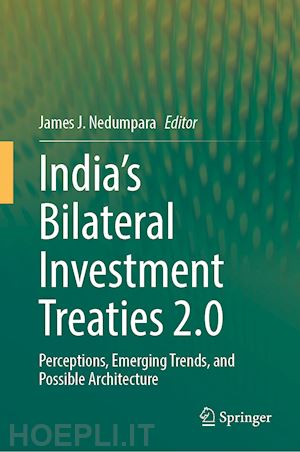
Questo prodotto usufruisce delle SPEDIZIONI GRATIS
selezionando l'opzione Corriere Veloce in fase di ordine.
Pagabile anche con Carta della cultura giovani e del merito, 18App Bonus Cultura e Carta del Docente
The book provides a deep and insightful enquiry into a set of persistent questions about investment treaties, including the causal relationship between investment treaties and investment, and their role in emerging economies such as India. It is innovative and pathbreaking as it distils past practices and experiences of investment treaties, from local and global perspectives, and seeks to sketch a template that could mark the next generation of bilateral investment treaties (BITs) for emerging economies, including India.
The book provides an authoritative account of whether the investment community accords importance to the existence of investment treaties while taking investment decisions, based on cross-country ethnographic research involving some of the key stakeholders drawn from foreign investor community, academicians, leading practitioners and key policy makers. Among other topics, it discusses potential evolution of investment treaties and how next generation treaties should look like, drawing lessons from past experiences, current practices and most importantly, the outlook for India in its next stage of development.
The book is very useful for academic community studying international investment law (IIA). Domestic and international practitioners of law will find the book a must read as the topic is emerging as a vibrant field of practice and consulting, and the volume focuses on some of the most debated areas in IIA. The book contains interest areas for policy makers, especially those who work in the field of commerce and economic diplomacy. It is also immensely useful to treaty negotiators and professionals that actively assist and advise negotiating teams of BITs and other investment disciplines which are part of trade agreements.
Chapter 1: Editor’s Introduction.- Chapter 2: Investor Perceptions on International Investment Agreements: Evidence from India.- Chapter 3: Post 2015 Model BIT: Exploring Alternative Models of Investment Protection and Dispute Resolution in India.- Chapter 4: Addressing Corruption: Reimagining India’s Investment Treaties.- Chapter 5: Sustainability in Investment Treaties: What the Future Holds?.- Chapter 6: Investment Liberalization and Trade Agreements: Filling a Gap.- Chapter 7: Investment Treaties and Judiciary: Mapping Indian Judiciary’s Approach post 2015 Model BIT.- Chapter 8: Time for a New Delhi Declaration on Global Investment Law.- Chapter 9: Conclusion.
James J. Nedumpara is Professor and Head of the Centre for Trade and Investment Law (CTIL), a leading think tank and advisory Centre established by India’s Ministry of Commerce and Industry at the Indian Institute of Foreign Trade (IIFT). James also holds the WTO Chair established by the World Trade Organization Chair programme at the IIFT. A prolific writer on international trade and investment law and an advisor to India’s trade negotiations, James has contributed widely to enhancing trade law capacity in India. Among other publications, James is the co-author of the comprehensive treatise, International Economic Law: Text, Cases and Materials (2021).











Il sito utilizza cookie ed altri strumenti di tracciamento che raccolgono informazioni dal dispositivo dell’utente. Oltre ai cookie tecnici ed analitici aggregati, strettamente necessari per il funzionamento di questo sito web, previo consenso dell’utente possono essere installati cookie di profilazione e marketing e cookie dei social media. Cliccando su “Accetto tutti i cookie” saranno attivate tutte le categorie di cookie. Per accettare solo deterninate categorie di cookie, cliccare invece su “Impostazioni cookie”. Chiudendo il banner o continuando a navigare saranno installati solo cookie tecnici. Per maggiori dettagli, consultare la Cookie Policy.